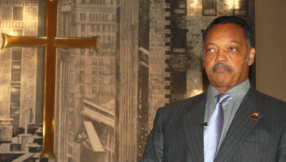
What do most Americans think of faiths not their own?
Not much.
That's according to a new Pew Research survey that asked 10,588 Americans if they had positive or negative feelings toward other faiths. Between 40% and 60% answered "neither favorable nor unfavorable" or "don't know enough to say."
"It may speak to people not liking to rate entire groups of people," said Patricia Tevington, the lead researcher. "Maybe there's some fear of stereotyping."
But some religious groups ranked higher in Americans' estimations. Jews, for example, scored fairly positively: 35% of Americans expressed a very or somewhat favorable attitude toward Jews, with only 6% expressing an unfavorable attitude. Catholics, too, got good marks (34% favorable vs. 18% unfavorable), as did mainline or ecumenical Protestants (30% favorable vs. 10% unfavorable).
Atheists and Muslims scored overall negative views. At the bottom of the list? Latter-day Saints, or Mormons. Only 15% of Americans had a favorable opinion of Mormons, while 25% said they had unfavorable views of them.
As for evangelicals, Americans were divided: 28% had favorable opinions of evangelicals while 27% had negative opinions (44% felt they didn't know enough to say). But as the study points out, there's a big difference between the way evangelicals are rated by all Americans (including roughly 20% of U.S. adults who describe themselves as evangelicals) and the way they are rated by Americans who are not evangelicals.
That's because most religious groups rate themselves highly, including 60% of evangelicals who have favorable opinions of themselves. But when evangelicals were excluded from the question, only 18% of Americans had favorable opinions of this group; 32% had somewhat unfavorable views (49% didn't register an opinion).
By contrast, mainline or ecumenical Protestants are viewed far more positively than negatively (only 11% of nonmainline Protestants viewed this religious group unfavorably).
Political partisanship may explain why evangelicals are viewed negatively by non evangelicals. The overwhelming majority of evangelicals identify with the Republican Party and this bloc is usually highly correlated with the so-called religious right.
Democrats and Democratic leaners, the survey found, view evangelicals much more negatively — nearly half (47%) had an unfavorable view of evangelicals. Only 14% of nonevangelical Republicans had unfavorable views of evangelicals, by comparison.
Evangelicals aside, Americans' views of other faiths may be influenced by whether they personally know people of other faiths, the study concludes. Some 88% of Americans know someone who is Catholic, for example. But few personally know a Muslim or a Mormon, which may account for why they view these groups negatively. (The balance of nonevangelical opinions toward evangelicals is the exception; it was negative regardless of people's personal familiarity.)
The survey found that an increasing number of Americans personally know an atheist. In 2019, 65% of Americans reported they knew an atheist. By 2022, it was 71%. That may account for why Americans view atheists has moderated somewhat and why Muslims and Mormons are viewed less favorably.
"There's a big distinction on whether or not you know someone of that religious group," Tevington said. "That tends to increase favorability."
The survey had a margin of error of plus or minus 1.5 percentage points.













